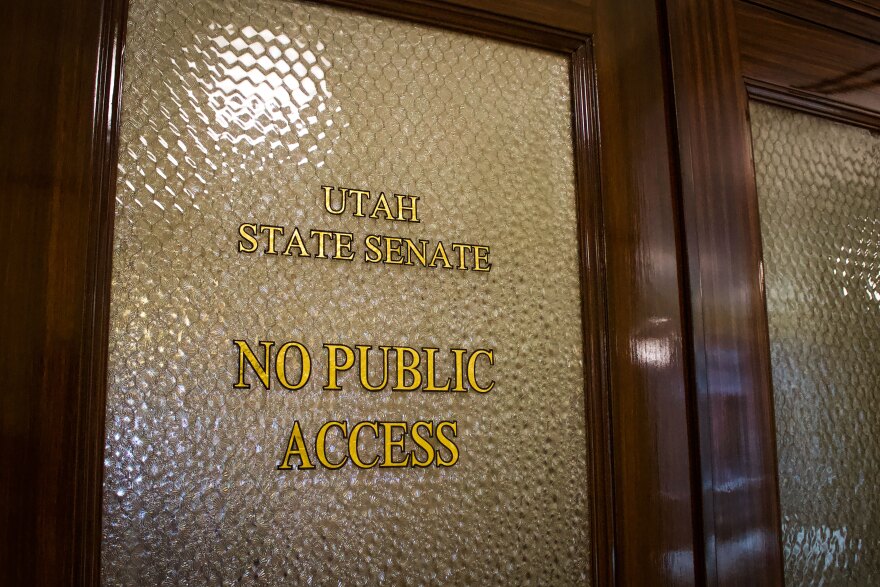Update: The governor has signed the bill. Our original story continues below.
Utah lawmakers have agreed to raise teacher pay and create a school voucher program that will let parents use public funds to pay for private school or homeschooling. The bill heads to Gov. Spencer Cox’s desk less than two weeks into the 2023 legislative session.
Rep. Candice Pierucci’s “Funding for Teacher Salaries and Optional Education Opportunities” bill passed the Senate on Thursday, 20-8, after the House affirmed it in a 54-20 vote last week.
Since there was more than a two-thirds majority in both chambers, voters will not be able to repeal it through the referendum process. In 2007, after the Legislature passed a voucher law, citizens gathered enough signatures to put the law on the ballot and it was overturned by Utah voters.
HB215 creates the “Utah Fits All Scholarship,” which will cost the state $42.5 million annually. The money will come from Utah’s income tax fund, which was called the education fund until last year.
Less than 5,000 students would be able to get money through the program, which equates to about 0.7% of the number of kids currently enrolled in public school. Although, students who are already in a private school or homeschooled are also eligible for the scholarship.
According to the bill, when parents apply for a voucher, preference will be given to lower-income families. Preference will also be given to students who have a sibling who has received a scholarship. Parents will not be able to apply for these vouchers until 2024.
Republican floor sponsor Sen. Kirk Cullimore said the amount of money the state sets aside for this program and the number of students able to get a voucher could increase in the future.
“If we have a big, long waiting list, then that is an indication that there is some success to this program,” Cullimore said. “I would say any potential for growth in this fund over the next several years or decade is not really a substantial threat to public education.”
Republicans who voted for the bill said the voucher program will help the state meet each child’s educational needs.
“We need to ask ourselves a slightly different question. Instead of, ‘what can we do to provide an education for 700,000 kids in this state?’ We need to ask ourselves, ‘what can we do to provide the education we can for this child?’” Sen. Lincoln Fillmore said. “And that is a difficult question to ask because it requires 700,000 answers.”
Fillmore said the only way to figure out the answer to that second question is by letting parents choose how their child is educated.
Democratic Sen. Kathleen Riebe, who is also a teacher in the Granite School District, argued even with the vouchers, not all parents and students will have the means to switch schools.
“So, if you’re telling me that we’re sending these kids because they can have a different, better experience, why don’t the kids in our schools get them?” Riebe said. “What are we doing in those other schools that we’re not doing in our schools in our neighborhood?”
Riebe said all students should get the same options and if public schools are not meeting the needs of students, public schools should be improved to meet those needs so that students who do have the option to go to a private school also get their needs met.
Republican Sens. Derrin Owens and David Hinkins joined all six Democrats in voting against the bill.
HB 215 fails to support students and weakens public education by redirecting public funds to private institutions without any safeguards, protections against discrimination, and transparency. Read our full statement below about today's passage of the bill #utpol #utleg pic.twitter.com/V6PlmHthpb
— Utah Senate Democrats (@UtahSenDems) January 26, 2023
Democrats repeatedly tried to make changes to the bill ahead of the final vote, including removing the teacher pay aspect so each issue could be debated on their own. All of their proposals failed.
Even though teachers would be getting a raise, the bill was consistently opposed by many public school employees and education organizations statewide. The Utah Education Association, the state’s largest teachers union, said in a statement that they are devastated by its passing.
“Despite an outpouring of emails, calls and text messages from educators and the public, lawmakers fast-tracked a voucher bill in less than two weeks. It is clear that this was a well-coordinated effort that began before the session started.”
The association went on to say in its statement that while this bill is referendum-proof, “UEA is exploring every option available to overturn this damaging legislation that jeopardizes the future of public education.”






